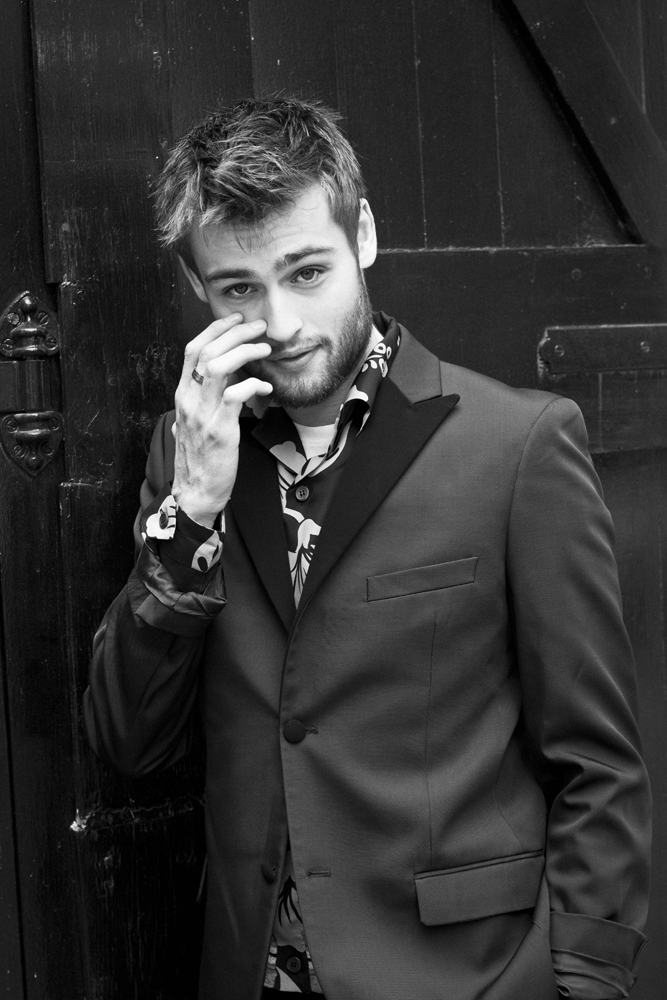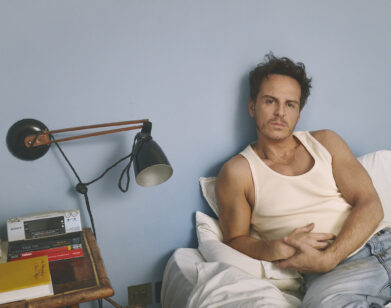The Movie Star
ABOVE: DOUGLAS BOOTH AT THE CAMDEN COLLECTIVE IN LONDON, OCTOBER 2013. PHOTOS: ALICE LUBBOCK. STYLING: MARA PALENA. GROOMING: AIMEE HERSHAN/CAREN USING MAC.
“I play Harry Villiers. The one who brings the prostitute to the dinner,” says Douglas Booth of his role in the upcoming Posh. “It’s going to be mental.” Based on the play by Laura Wade, Posh revolves around the privileged members of a fictitious, all-male secret society at Oxford University. The cast is a laundry list of young British talent: Sam Claflin, Max Irons, Sam Reid, and Freddy Fox all play members of the “Riot Club,” with Holliday Grainger, Jessica Brown-Findlay, and Natalie Dormer as their female friends. It is one of three high-profile films that Booth has coming out in 2014; the others are Darren Aaronofsky’s biblical epic Noah alongside Russell Crowe, Jennifer Connolly, Emma Watson, and Anthony Hopkins, and the Wachowski siblings’ “space opera,” Jupiter Ascending. “I had a mental year,” the British actor admits. “I only had a week between Jupiter Ascending and Posh.”
Although only 21, Booth’s résumé is impressively eclectic. Over the last three years, Booth has played Shakespeare’s Romeo, Dickens’ Pip, ’80s glam-pop star Boy George, and Miley Cyrus’ lover. For the month of December, Booth is taking a rare break. “I’m spending my time up to Christmas reading scripts,” he explains. “If I’m really productive, I can read one a day. But normally it’s about three to four a week. I’m a really slow reader because I’m dyslexic.” Booth understands the importance of good writing: “You can have an amazing director and terrible script, and the film’s not going to be great,” he says. “But if you have the most incredible script and an okay director, you could still get a really good film.”
EMMA BROWN: Did you have a school nativity play when you were a child?
DOUGLAS BOOTH: I did. Oh my God, what was I? I think I was a shepherd, with a tea towel on my head. My teddy bear was my flock. I have a picture of it somewhere.
BROWN: Were you the only shepherd? Or “Shepherd Number Three” ?
BOOTH: I was probably “Shepherd Number Nine” or something like that. Didn’t even have the glory of being “Shepherd Number 10.”
BROWN: When did you first become aware of Darren Aronofsky?
BOOTH: I was a bit young when Requiem for a Dream (2000) came out. I missed that one. I saw The Fountain (2006) first. I saw The Fountain because my friend came over one day and said, “This is my favorite movie I’ve ever seen. Please watch this,” and I watched it and that was amazing. Then I watched The Wrestler (2008) and then I went back and watched Requiem, and then Pi (1998). I saw Black Swan (2010) when it came out.
BROWN: I found Black Swan too harrowing to watch, and I know a lot of people feel that way about Requiem for a Dream.
BOOTH: Yeah, Requiem for a Dream—it’ll put you off a lot of things, that film, that’s for sure.
BROWN: Were you at all nervous about what you’d have to do in Noah?
BOOTH: No, not really, I had read the script. I was in very trusty hands—Darren’s very respectful of all those actors, and he’s a brilliant director. I didn’t plan on making a biblical film. I planned on making a Darren Aronofsky movie.
BROWN: You started quite young. What was your first professional role?
BOOTH: My first professional role was a part in From Time to Time (2009), which is a small British film directed and written by Julian Fellowes. It never had a big release, but it was a really cool movie. It had Maggie Smith, Timothy Spall, Dominic West, Hugh Bonneville.
BROWN: That’s a pretty good way to start.
BOOTH: Yeah, it wasn’t too bad. Then I went off to do a mini series called The Pillars of the Earth (2010), and then my third job was playing Boy George in Worried About the Boy (2010).
BROWN: Is he your go-to karaoke artist?
BOOTH: Normally I wouldn’t get up and do karaoke unless I was really drunk, but I could be semi-drunk and Boy George would come on and I’d probably have this false sense of confidence.
BROWN: Did Julian Fellowes call you straight away for Romeo and Juliet (2013)?
BOOTH: No, it was totally separate actually. It was a total coincidence. But it was a pleasure to work with him again after a couple of years.
BROWN: How did you get your first role?
BOOTH: Just auditioning. I was lucky enough to get an agent when I was 15. I just auditioned and auditioned and auditioned, and I got my first job when I was 16. When I was younger, I looked a lot older than I was. They have these working laws in England where you have to be 16: if you’re over 16, you don’t have to be restrained by working hours and things like that. In America, it’s actually 18. So no one’s going to hire a 15-year-old who’s never actually done a job before to play someone who is 16 or above. They’ll just get someone who’s 16 or above, because it means they don’t have to rest them every two hours and you don’t have to school them. So I was going up for all these roles and getting none of them. But eventually I turned 16, so all those boundaries went away and that’s when I got the first job. All actors know that, if you’re getting into this game, you have to take rejection on every level. Even some of the biggest names.
BROWN: Did you come from a family where being an actor was a feasible goal?
BOOTH: Yeah. None of my relatives were actors or anything, but my parents were always relaxed and just wanted me to do whatever made me happy, whether it was being a cobbler or being a gymnast or whatever. They would have supported me wholeheartedly. My sister’s an artist, so they could have had two potentially totally penniless children.
BROWN: Do you feel like your life has changed since Romeo and Juliet came out this autumn?
BOOTH: I’ve been lucky in the sense that my life has gradually changed. Nothing’s been changed overnight. It’s like watching your cat grow: you see it every day, so you don’t really see it change, you wake up one day and it’s a bloody great thing. Your friends come round who you haven’t seen for a couple months and they’re like, “Oh my god, your cat’s grown so much again.” And I’m like, “Has it?” But when you’re living it… I just find that my life has subtly changed bit by bit, so I don’t ever really notice it too much.
BROWN: What makes someone a good actor?
BOOTH: A dedication. Often you find actors have big hearts; they’re quite emotional people. Talking to actors who date other actors, and talking to people who deal with other actors, they often get emotionally caught up in lots of different things. They often wear their hearts on their sleeves. They feel things quite a lot—often to the nth degree, which I can imagine could make it quite difficult to date some of us. I think it’s about having an emotional availability that you can kind of draw on. But I’m also searching for that. I’ll be searching for the answer to that question for the rest of my life.
BROWN: Do you take all of that into consideration before dating another actor?
BOOTH: You can’t do that. We’re not intelligent enough to do that.
BROWN: Are most of your friends actors?
BOOTH: I have a good few friends who are actors, but the majority of them aren’t. Some of my best friends—some are actors, some are musicians. My friends from growing up aren’t actors, but then of course, through the nature of business, a lot of them are.
BROWN: Are you still in touch with your friends from elementary school?
BOOTH: Yeah, I’ve got one of them sitting opposite me right now.
BROWN: Can actors be friends with their directors, or does there need to be a bit of distance?
BOOTH: There’s a balance. I’ve had friends who have come away who’ve said, “I shouldn’t have become such close friends with the director.” You always want to get on with the director, but I personally prefer a relationship where you respect them—you get on really well with them, but they’re boss, as it were. It’s about trusting your director, for better or for worse. They’re the one’s seeing what’s coming out on the monitors, so you have to try and trust what they say.
You’re always going to have ups and downs—if you look at the careers of a whole bunch of people I respect, some of them have good movies, some of them have bad movies. I remember Andrew Garfield said that the only power we really have as actors—or one of the main powers we have as actors—is our choices. We can make interesting choices, but as soon as you’ve made that choice, so much else is in play: the director, the script can change, the other actors. All you can do is try to make interesting choices and, once you’re in it, just do the best you can.
For more of our 14 Faces of 2014, click here.







